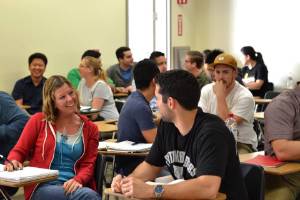Lavin Entrepreneurship Center Community Newsletter
July, 2020
Mentor Program Survey Findings

Over the last few months, the Lavin Entrepreneurship Center has launched several surveys
to participants in five key programs to gather more comprehensive feedback. To ensure
our community is kept in the loop, we will be highlighting significant and relevant
findings from these surveys over the coming newsletters, starting first with our Mentor
Program. Our Mentor Program has been an intricate component of the Lavin Entrepreneur
Program. Lavin Entrepreneurs are students linked with mentors to develop professional
competencies and receive guidance during their exploration of entrepreneurship. The
expectation of this program is that mentors and mentees build healthy relationships
that endure for the entire length of the program and consistently meet to discuss
progress, goals and assignments.
Over a period of two weeks, March 17th to April 1st, 2020, we sent out a Qualtrics
survey to mentors and mentees detailing questions about the quality of relationships,
experiences with the program, and satisfaction levels. For this particular survey,
one crucial finding was that in addition to a 100% connection rate between designated
mentorships, 52% of mentors reported connecting with mentees other than their assigned
mentee and 60% of mentees reported receiving mentorship from a mentor other than their
assigned mentor. Currently, our program only requires mentees to connect with their
assigned mentors. Connecting with multiple mentors is something that we will consider
for Lavin Entrepreneur students going forward.
Jim Kalb, a current mentor, believes that “no one ever achieves any level of success
on their own.” Kalb continues to be a mentor with our program because "It’s very rewarding
to watch [Lavin Entrepreneur students] grow and mature into a future leader and/or
promoter of an idea/product/service."
Another key finding from this survey was that aside from face-to-face interactions,
texting was the second most favored form of communication between mentors and mentees.
In order from most used to least, our mentorships communicated via face-to-face, texting,
voice calling, direct email, and video chat. This survey was conducted towards the
beginning of San Diego’s stay-at-home orders, so our center is eager to monitor the
primary forms of communication mentorships utilize as we progress through a new age
of communication and interaction.
As we look towards starting a new round of mentorship with our class of 2022 Lavin
Entrepreneurs, we want to ensure that our program continues evolving for the benefit
of both mentors and mentees. If you are interested in acting as a mentor, you can
learn more about the program on our website or contact Bernhard Schroeder at [email protected] .
Enriching the Entrepreneurship Curriculum

A large part of entrepreneurship is recognizing potential for improvement and being
receptive to the feedback of those involved; the same applies to entrepreneurship
education. The entrepreneurship minor curriculum at San Diego State University is
being elevated, in part due to the feedback of students and the tenured faculty's
decision to close gaps in the current curriculum.
Tenured faculty, with input from the Lavin Center, have developed a brand new course,
MGT 420: Entrepreneurial Opportunity Recognition and Evaluation. The course’s main
objective will be introducing students to the process of discovering significant problems
and showing students how to go about validating possible solutions. Students will
learn how to identify different trends and problem spaces, along with developing well-thought
out questions which will serve as the basis of their pursuit. Overall, the course
looks to build a big-picture mindset within students, both for problem discovery as
well as impactful solutions.
Dr. Mujtaba Ashan, entrepreneurship professor within the Fowler College of Business
hopes the new course will offer students a better understanding of the entrepreneurial
process and the different paths of entrepreneurship, while making the curriculum “more
practical and relevant, along with rigorous.” Ultimately he wants students to “understand
the journeys that have gotten them to where they are.”
Starting in the Fall 2021 semester, students who enroll into the entrepreneurship
minor will be required to take MGT 420. Rather than taking two required courses with
nine elective units, the program will change to three required courses and six elective
units. Students already enrolled in the minor will not be required to take MGT 420
for their completion of their minor, but will be allowed to enroll in the course.
Check here for more information about the entrepreneurship curriculum at San Diego State University.
Date Set for 2021 California Entrepreneurship Educators Conference

Mark your calendars! Our 2021 California Entrepreneurship Educators Conference has
been set for April 15th and 16th, 2021 and will once again be hosted virtually to
allow for wide-spread engagement.
The theme of the 2021 California Entrepreneurship Educators Conference is reinventing the discipline of entrepreneurship. Maintaining continuity, reinventing is an appropriate next step from last year’s
theme of reimaging the discipline of entrepreneurship. With higher education courses
and resources transitioning online and the continued closure of labs, along with the
natural progression of entrepreneurship, there is an opportunity to reinvent the way
we teach and research entrepreneurship.
Our most recent effort brought forth many rewarding changes to the execution of the
conference and excited conversations about the reimagining of entrepreneurship. Moving
our conference into a virtual space enabled us to reach expansive parts of not just
the country, but the world, and bring together more educators than ever before. We
had 980 conference attendees from 65 countries, 28 states, and 875 universities and
organizations. Our 2020 conference was our most successful conference to date as we
continue to try and impact entrepreneurship education and research.
Using what we learned from the execution of this year’s conference, we have begun
planning our 2021 California Entrepreneurship Educators Conference. More details will
be provided as we move forward. We will open a page on our website for session proposals
during the early fall. Visit our website for more information about the 2021 California Entrepreneurship Educators Conference and for session videos from our 2020 California Entrepreneurship Educators Conference.
For any additional questions, contact Jacinda Molina at [email protected].